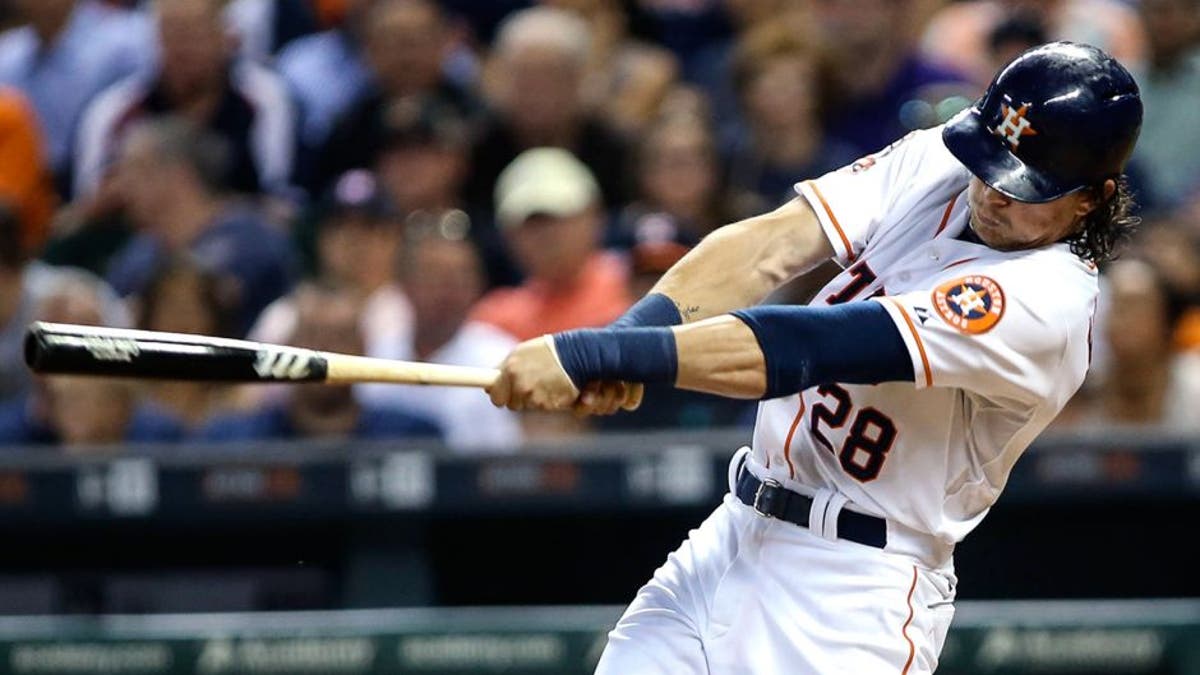
Jun 25, 2015; Houston, TX, USA; Houston Astros center fielder Colby Rasmus (28) drives in a run with a sacrifice fly during the fourth inning against the New York Yankees at Minute Maid Park. Mandatory Credit: Troy Taormina-USA TODAY Sports
BOCA RATON, Fla. -- All week at the Major League Baseball general managers' meetings, team executives and agents have wondered aloud whether any of the 20 qualifying offers to top free agents will be accepted.
Even a single "yes" before Friday's 5 p.m. ET deadline would make history; over the first three years of the current labor agreement, players rejected all 34 qualifying offers.
This week's outcome will carry far greater significance than as a discussion topic for industry insiders; it will help to frame a sensitive issue in the next round of collective bargaining negotiations, which are likely to begin in the coming months.
Notably, MLB commissioner Rob Manfred made clear Tuesday that he considers the qualifying offer system a success, regardless of what happens Friday.
"I think about the qualifying offer this way, because this was the dialogue at the (negotiating) table," Manfred said. "We were trying to identify the group of players that were significant enough that the (team's) loss merited the team getting (draft-pick) compensation and that the player would be in high enough demand that the compensation availability would not ruin his market.
"The fact that players say no, go out into the market and get contracts even though the signing club is giving up a draft choice, kind of says to me we got it right. I don't think you need someone to accept."
Undoubtedly, the commissioner's office is pleased with the current system -- which continued the practice of tying free-agent signings to draft-pick compensation, albeit in a more efficient form. Beyond the elite (read: nine-figure) tier, teams are reluctant to sacrifice draft picks in order to sign free agents. That's especially true because of how the soft amateur spending caps have negated teams' ability to entice late-round high school seniors with big-dollar bonuses.
The net result has been a depression of free-agent values for a handful of free agents each winter -- with downward implications for the rest of the market. Collectively, MLB teams have saved many millions of dollars, although top-end free agents like Max Scherzer and Robinson Cano were unaffected.
So how will the 20 players in question -- and the MLB Players Association itself -- respond in this crucial week? And if even one player accepts, will MLB cite the example at the bargaining table as affirmation of the system's fairness?
Such a decision, by the way, would be eminently reasonable: The one-year tender at $15.8 million would be a substantial raise over the base salaries Colby Rasmus ($8 million) and Marco Estrada ($3.9 million) earned in 2015.
Even more perspective: An NHL player accepting a $15.8 million contract would immediately become the highest-paid player in the league ... by nearly $4 million. Only one NFL player -- cornerback Darrelle Revis -- has a base salary in excess of $15.8 million, according to the database at spotrac.com.
Indeed, there is no shame in earning $15.8 million for a season of work. But this week, agreeing to such a contract could have ramifications as far-reaching as the pages of baseball's next collective bargaining agreement.
